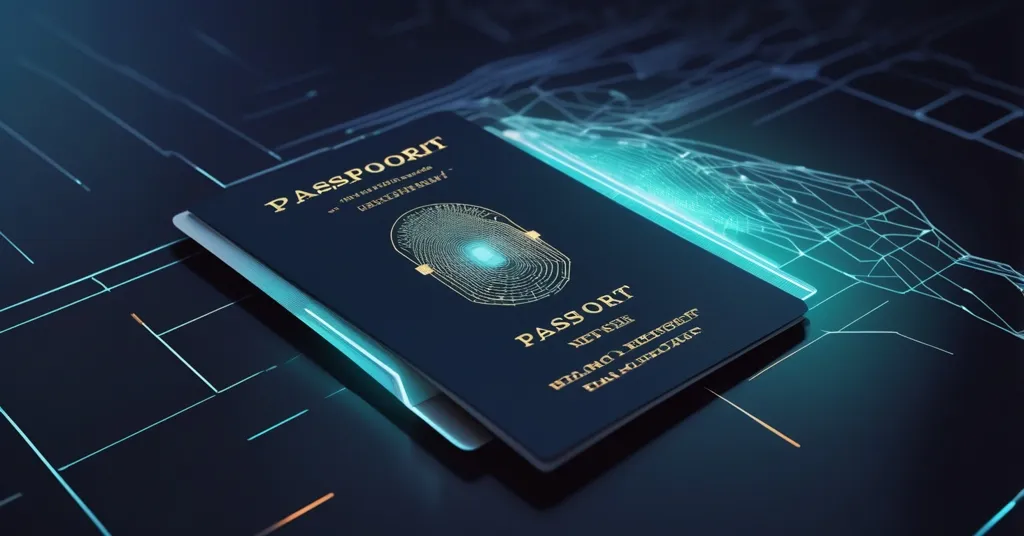Jordan and Greece Push Digital IDs: E-Passports, Citizen Numbers, and Blockchain Debates

Jordan and Greece Forge Ahead with Digital Identity: E-Passports and Citizen Numbers in Focus
Jordan and Greece are making headlines with groundbreaking digital identity initiatives that could reshape how governments handle personal data and public services. From Jordan’s rollout of high-tech e-passports to Greece’s unified Personal Citizen Number system, these moves signal a global pivot toward tech-driven governance—yet they also stir up thorny debates about privacy, centralization, and the role of blockchain in our future.
- Jordan’s E-Passport Launch: Biometric-enabled passports debut on September 1 with top-tier security.
- Greece’s Digital ID Push: Personal Citizen Numbers (PCN) roll out with a September 5 deadline for claims.
- Blockchain and Beyond: Both nations eye distributed ledger tech and CBDCs, sparking crypto debates.
Jordan’s E-Passport: A Bold Step into Digital Security
On September 1, Jordan will unveil its electronic passport (e-passport) program, a significant upgrade to its identity infrastructure. Described by Interior Minister Mazen Faraya as a “qualitative leap” in government services, these e-passports aren’t just a new look—they’re a fortress of tech. Each document features an electronic chip storing biometric and personal data, designed to make forgery a pipe dream with laser printing and a damage-resistant polycarbonate build. They come with a five-year validity, match the cost of traditional passports, and can be applied for online via the Civil Status and Passports Department portal or the Sanad app, with Jordan Post ensuring delivery straight to your door. For more details on the launch, check out the official announcement from Jordan’s Ministry of Interior.
This isn’t a rushed job either. Jordan has implemented a public key infrastructure (PKI) system—a framework using encryption to secure digital identities and transactions—earning a nod from the International Civil Aviation Organization (ICAO) for global interoperability. As Digital Economy and Entrepreneurship Minister Sami Smeirat pointed out, this ICAO endorsement isn’t just a pat on the back; it’s a guarantee that these passports will be accepted worldwide. Beyond travel documents, Jordan’s broader digital push is impressive, with a 23% surge in electronic services last quarter and 25 services already live. Yet, for all the hype, questions linger. How ready are rural communities, often plagued by digital literacy gaps, to embrace this tech? And with biometric data centralized in government systems, isn’t this a neon sign for hackers or surveillance overreach? Some online discussions highlight similar security concerns with e-passports.
Greece’s Personal Citizen Number: Streamlining Identity with a Deadline
Meanwhile, Greece is tackling domestic governance with its Personal Citizen Number (PCN) initiative, launched in May as a single digital identifier to replace a messy web of ID numbers. Citizens have until September 5 to claim their PCN through the gov.gr platform—a quick two-minute process linking Taxinet credentials and the National Contact Register to a phone number. Miss the deadline, and you’ll get auto-assigned a number, no exceptions. Already, 530,000 Greeks have secured their PCNs, with 66,000 new ID cards issued bearing the identifier. For the latest updates on this rollout, see the adoption stats and EU compliance details. Dismosthenis Anagnostopoulos, Greece’s Secretary General for Information Systems and Digital Governance, emphasized the simplicity, stating:
“We’re correcting existing errors in personal records so that people can be served more easily.”
This isn’t just about cutting red tape; it’s a piece of Greece’s post-financial crisis recovery puzzle. After the economic turmoil of 2009-2018, digitization is a lifeline to rebuild trust and efficiency, aligning with EU digital identity standards like eIDAS. The PCN ties into wider tech adoption, from the MyCoast platform logging over 26,000 reports to AI tools combating fake news. But centralizing personal data like this? That’s a privacy tightrope, especially for a nation still wary of institutional overreach. For a deeper look at such concerns, explore how personal numbers impact privacy.
Blockchain and CBDCs: A Double-Edged Sword for Crypto Enthusiasts
Both Jordan and Greece aren’t stopping at digital IDs—they’re dipping toes into blockchain and central bank digital currencies (CBDCs), arenas that hit close to home for crypto fans. Jordan, with IMF backing, is exploring a retail CBDC while testing a national blockchain network, though specifics on its use—whether for identity, supply chain, or finance—remain murky. Greece, on the other hand, has partnered with financial titan JPMorgan, which set up a Payments Innovation Lab in Athens to push distributed ledger technology (DLT) for payment systems across corporate and wealth management sectors. Learn more about this partnership through JPMorgan’s innovation hub updates. These moves signal blockchain’s slow creep into mainstream governance, a win for tech validation.
From a Bitcoin maximalist perspective, though, CBDCs are a hard pass. They’re government-controlled digital cash, the antithesis of Bitcoin’s permissionless, trustless freedom. Think of CBDCs as a state-issued debit card—every swipe tracked—versus Bitcoin as cold, hard cash you control without a middleman. Still, there’s a silver lining. State adoption of blockchain, even in centralized forms, normalizes the tech, potentially paving the road for decentralized solutions. Call it a slow burn of effective accelerationism—sometimes, clunky government experiments are the cracks through which true disruption seeps. Could these systems one day integrate with self-sovereign identity projects like uPort or Civic, built on blockchain’s privacy principles? It’s a long shot, but not impossible. For broader context, check out blockchain’s role in government initiatives.
Privacy Risks: The Elephant in the Digital Room
Let’s not sugarcoat it—centralized digital identity systems are a double-edged sword. Jordan’s e-passports and Greece’s PCNs promise efficiency, but they hoard sensitive data like biometric scans and personal records in government databases. History doesn’t exactly inspire confidence here. Look at breaches like Equifax in 2017, where 147 million people’s data got exposed, or government surveillance scandals like the NSA’s PRISM program. These aren’t hypotheticals; they’re warnings. Handing over your biometric fingerprint or facial scan to a centralized system is like tattooing “hack me” on your forehead—fine until it’s not. To understand the basics of such systems, refer to this explanation of digital identity.
For the crypto crowd, this is where decentralized identity (DID) shines as an alternative. Using blockchain and zero-knowledge proofs—a cryptographic method to prove something is true without revealing the data itself—DID lets you control your identity without a government or corporate middleman. Bitcoin’s pseudonymity already offers a glimpse of this privacy ethos; imagine applying it to passports or citizen IDs. Yet, governments aren’t rushing to cede control to such systems. Jordan and Greece might tout security, but without transparent audits or ironclad protections, trust remains a gamble. And in regions with spotty internet or tech access, like Jordan’s rural zones, even opting into these systems isn’t a given for everyone. For a summary of both nations’ efforts, see this report on Jordan and Greece’s digital ID adoption.
Global Context: Where Do Jordan and Greece Stand?
Zooming out, these initiatives aren’t happening in a vacuum. Think Estonia’s blockchain-based e-Residency, letting anyone worldwide become a digital citizen, or India’s Aadhaar, a biometric ID system for over a billion people. Each nation is wrestling with the same conundrum: how to modernize without sacrificing trust or privacy. Jordan’s e-passport aligns with ICAO’s secure travel push, while Greece’s PCN fits the EU’s interoperable ID vision. But unlike Estonia, where blockchain underpins much of the system, Jordan and Greece are still flirting with DLT rather than committing. And unlike India, where Aadhaar faced massive privacy backlash, public resistance in these countries remains underreported—though it’s likely brewing beneath the surface. For more on the joint context, read about Jordan’s e-passports and Greece’s digital IDs.
For us in the crypto space, these are test cases. On one hand, blockchain’s role in digital IDs and payments validates its utility beyond speculative coins. On the other, it’s a stark reminder that decentralization is a distant dream when governments and corporates hold the reins. Still, every digitized step chips away at the old guard, and if Bitcoin and its allies keep pushing, we might just sneak through the gaps to redefine sovereignty—digital or otherwise.
Key Takeaways and Questions for the Crypto Community
- What sets Jordan’s e-passport apart in the digital identity race?
Its biometric chip, tamper-proof design, and ICAO-backed global acceptance mark it as a serious upgrade, positioning Jordan as a regional leader in secure travel tech. - How does Greece’s PCN aim to transform public services?
By unifying multiple ID numbers into one digital identifier, it slashes bureaucratic delays, though the centralized data storage raises red flags for privacy hawks. - Why should blockchain enthusiasts care about these state-led initiatives?
Jordan’s blockchain network and Greece’s DLT push with JPMorgan show the tech gaining traction in governance, potentially normalizing it for future decentralized breakthroughs like Bitcoin-driven systems. - What are the glaring risks of these digital ID systems?
Centralized storage of biometric and personal data is a magnet for hacks and surveillance, a far cry from the self-sovereign identity models crypto advocates champion. - Could Bitcoin’s privacy principles shape better digital IDs?
Absolutely—Bitcoin’s pseudonymity and blockchain’s privacy tools like zero-knowledge proofs offer a blueprint for identities you control, not governments, though adoption by states remains a tough sell.



